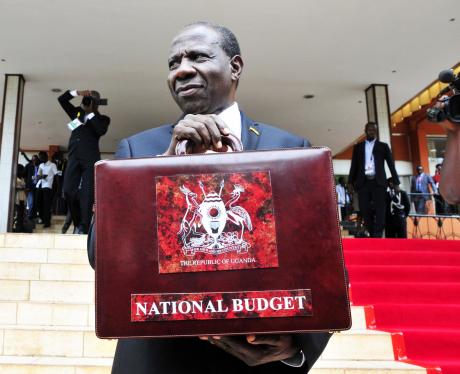President Yoweri Museveni has said that after achieving recovery of Uganda’s economy with an annual growth of 6.1 percent over the last three decades, government is now focusing on reducing the cost of doing business by investing in electricity, lowering the cost credit and transport.
The President says the cost of transporting cargo by road remains high – costing USD 3,000 dollars per 40ft container compared to USD 1,800 per same container by rail. This cost can only be brought down with better infrastructure for road and water transport, according to Museveni.
This was part of the President’s speech during the celebrations in Sironko district to mark 57 years since Uganda attained Independence.
Museveni began his remarks pointing out that Uganda was entangled in turmoil facilitated by sectarianism
based on religion, tribe and race, as well as anti democracy and neocolonialism.
He noted that since 1986 when his government took over power, the NRM ideology gained an upper hand and “that’s how Uganda built strong national army for the first time in 500 years”
“Uganda achieved minimum economic recovery, built a strong army, we started the process of development and addressed social services,” Museveni said.
The President said that economic recovery has happened despite other bottlenecks such as the high cost of credit by what he termed as exploitative banks. But government is looking to tackle this bottleneck by further capitalization of Uganda Development Bank (UDB), he said.
“The solution that will make doing business cheaper is investment in rail and water transport. This is where focus should be. Now that we have money we are going to prioritize production not consumption,” he said.
This, he said, is a sure way of realizing double digit growth of the economy – around 11% and 12%.
He used the event to push for economic integration across the African continent, saying it will give African countries stronger bargaining power with major markets like America, Europe and Asia. He said the African Continental Free Trade Agreement (AfCFTA) which was signed by 54 African countries in 2018 is a step in the right direction.
“You cannot sustainably produce without a large market such as EAC or COMESA. The AfCFTA will not only absorb our products but it will also help us negotiate credibly with major markets like USA, Europe, Asia and others”.
The President made reference to Zimbabwe which has suffered economic sanctions by the West for 20 years. He said that without balance of trade, Zimbabwe remains at a disadvantage since it lacks the economic power to retaliate. However in the case of the ongoing trade war between China and the U.S., there’s a balance which is why both countries have managed to impose economic sanctions against the other.
“Zimbabwe has been hit (by sanctions) but it can’t hit back because it is small. But with AfCFTA, if they (the West) hit us, we can hit them back. Small African countries which can’t stand against bullying is where the problem is. Economic integration under CFTA is for the prosperity of our people,” said Museveni.
He appealed to Ugandans to engage in production in the four sectors of – commercial agriculture, manufacturing, services and ICT. Museveni expressed concern that 68 percent of the households that are still engaged in subsistence rather than commercial agriculture.








Comments